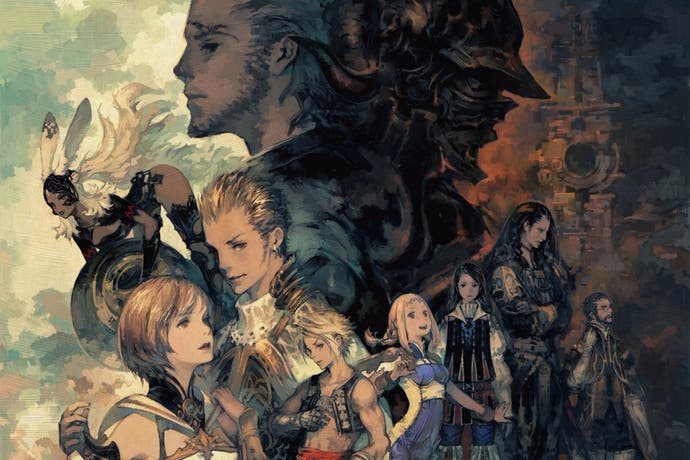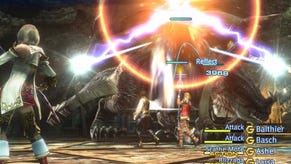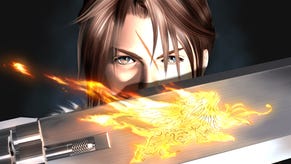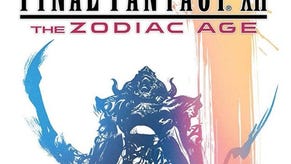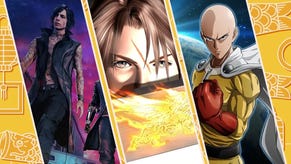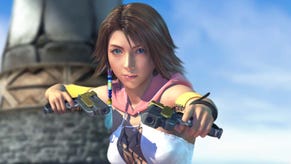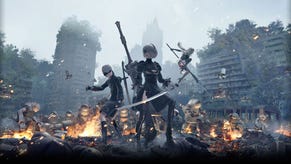A translator's tale: Inside the building of Final Fantasy 12's Ivalice
Fran service.
"They just don't make games like that anymore. I don't think they ever really made games like that."
Final Fantasy 12 is, for myself and countless others, a very special game. A bold, high production adventure that dared to toss aside the conventions of a well-loved series, and a snapshot of a formative time in the industry; just as it emerged from the enormous growth of the late 90s and before the big business of what followed would take hold, it's a time when blockbuster games had just emerged from their adolescence but their heads were still full of grand ideas.
There's a magic to Final Fantasy 12 that hasn't dulled to this day, and returning to this week's remaster happily proves that, love it or hate it, there's been nothing quite like it ever since. I've already spoken a bit about the systems that make Final Fantasy 12 stand out, and I was recently given the chance to explore the other significant part of its charm; the world of Ivalice, and how a small team of translators added a dimension to one of the most remarkable video game localisations there's ever been.
If you've any interest in Japanese video games you probably know the name Alexander O. Smith, a remarkable feat itself given how translation is often one of video gaming's unsung tasks. That was certainly the case when Smith, who talks to me from his base in the seaside city of Kamakura, made his first steps as a translator.
A PhD candidate in classical Japanese literature with a penchant for pen and paper RPGs, Smith got his first job working for what was then known as Square Soft in its California office. "I wasn't that familiar with Square games at the time - I'd played Final Fantasy 7 - because I'd been mostly playing Ultima on Mac and Wizardry. I didn't have much experience of JRPGs.
"Translation was very hit and miss back then, because most of the time the companies that were making games had no idea what was entailed. Even if they had translators on staff, they had no idea what the translators needed to do. There was a lack of information and transparency. Some places managed to do good work, some places did not - so you get classics like Zero Wing and 'All your base are belong to us.'"
Square Soft was one of the better companies in that regard, though there was still much left to be desired. Final Fantasy 7, a worldwide phenomenon, was beset by numerous errors and oversights - all of which is understandable when you realise that a lone Square Soft USA employee, Michael Baskett, was given the colossal undertaking of translating whole mountains of text from Japanese to English.
"When I joined there wasn't a formal structure in place for localisation in-house," says Smith. "Up until fairly recently they'd been outsourcing their translation - Final Fantasy 8 was my first project, I came halfway in and didn't do a whole lot - and I remember there being a lack of information and often they didn't have game files in a timely manner, so we'd have to play the game and translate off the screen."
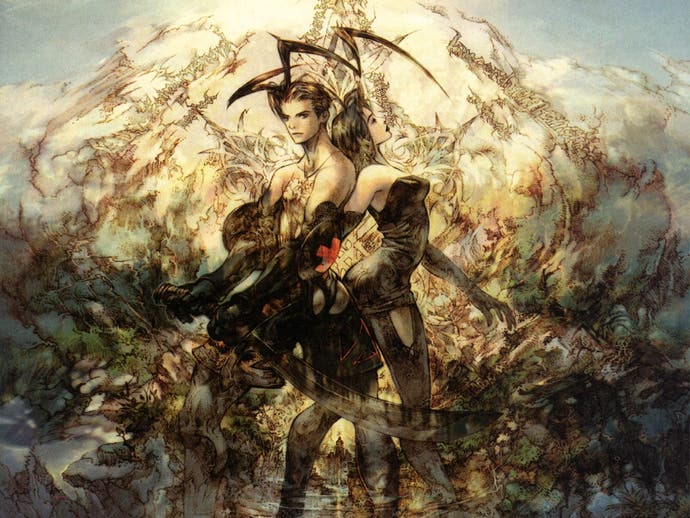
There was still a ramshackle approach to localisation that persisted for the first few years of Smith's career. "It was still an afterthought, and we were constantly snuck in under a different division's leadership. Often we'd be reporting to the same person who was in charge of IT, or business development or something that had nothing to do with localisation. It wasn't until a few years later that we had a localisation department and a localisation director and things went a little more smoothly then. It was sort of the wild west."
Final Fantasy 8 benefitted from a more serious approach to localisation - Smith joined a team of three translators, working on the Laguna Loire section of the game - as the team became more organised. "There was a lot going on at the time - it was the maturing of the company. It was just after the real heyday of a lot of those companies in the late 90s where they went a little wild and expanded quite a lot, and they were slowly pulling back in and picking up a little bit of the fat and not being quite so experimental. It was an interesting time - it's when the modern Square was forming."
Smith went to work on a number of titles in his first year at Square - this was a time when a company such as Square would release up to 20 games in a single calendar year - and the partnership that would help make his name came soon after.
Yasumi Matsuno started work at Square in 1995 having made his own name at developer Quest on the tactical role-playing games Ogre Battle and Tactics Ogre. Alongside artists Hiroshi Minagawa and Akihiko Yoshida, Matsuno made the jump to lend the trio's formula to the world of Final Fantasy, introducing the same dense systems, elegant world-building and intricate storytelling for Final Fantasy Tactics. It was a critical success, and his next project would be the wholly original action RPG Vagrant Story. Alexander O Smith was assigned for translation duties.
"It was interesting in that it was at once far deeper in terms of setting and the realisation of the world and characters than any project I'd worked on up to that point, and at the same time it was also very small - story wise, it wasn't the vast thing you'd see in something like Final Fantasy, which was quite nice. There was a lot of material to work with - both in the game and behind it that was driving the story - and we had not a ton of time, but because the game was so short and not very text heavy I was able to spend quite a bit of time on each part of it."
Working under Rich Amtower - who's now employed at Nintendo's Treehouse localisation team - the pair delighted in the rich medieval backdrop of Vagrant Story.
"The quality of the writing and the quality of the story itself set a really high bar - that's always really inspiring when you come along as a translator and you have to figure out how to work a text into a shape that will function equally as well in English.
"The setting really spoke to both of us, too. Rich had a masters in Middle English - so we got our academic geek on with it. Maybe going a little too far in that direction, but I think the feel of the game would have been odd if everyone was speaking modern English."
I've always been curious how much of that richness of language which marks out Matsuno's work is his own, and how much has been introduced in translation - it's worth noting that the slightly archaic way of speaking was absent in Matsuno's first Square game, Final Fantasy Tactics, and was only added in via a later translation for the PSP version War of the Lions. Alexander O Smith, meanwhile, has worked on nearly all Matsuno's major works since.
"I would say the original is a little more direct - not that ours was looping in circles, but it's not inflected Japanese, it's very straightforward Japanese. It's a medieval European setting, and there weren't Japanese people in medieval Europe. It would be very odd to try and impose an accent on the Japanese in that kind of setting - if you gave them all southern Japanese accents or made them all talk like samurai it'd be very jarring for the Japanese player.
"It's very straightforward in Japanese, but when you look at writing in the medieval times, any writing in English that's part of that milieu, wordplay is really important, the leitmotifs where you're using language to create a mood. Those are things that we introduced, but the inspiration came entirely from the original Japanese. It created the world and we tried to do service to that world in the translation."
Matsuno's star was rising within Square, and his next project would be no less than his own mainline Final Fantasy game. Unfortunately circumstances meant that Smith and Matsuno wouldn't be working directly alongside each other - Smith left Square in 2002 to form his own company with co-translator Joseph Reeder, and by the time he began work on Final Fantasy 12 as a contractor, Matsuno had departed. Still, the Matsuno imprint was still very much there in Final Fantasy 12.
"He has a very good sense of characters - they have individual personalities and their intent is very clear. This is actually something that's somewhat rare in Japanese writing - it tends to favour the big moment, and the big scene, and they don't really care about how you got there. From a western perspective, lots of times Japanese dramatic writing will seem lacking in areas like motivation and the intent of the characters won't be entirely clear. They're putting the pieces together so they can get to the big scene.
"Matsuno is much more of the classic western style writer in the sense that all of his characters have very clear motives and objectives, so that when they're in a room together instead of everyone just participating in putting together the building blocks to get to the big moment, you have individual characters that want different things butting off each other, there's the back and forth that makes for great dialogue. And that structure is very important, and it really helps the translation. Even if ultimately the things they're saying drifts slightly when you put it into English, having that chemistry there to start with makes a huge difference."
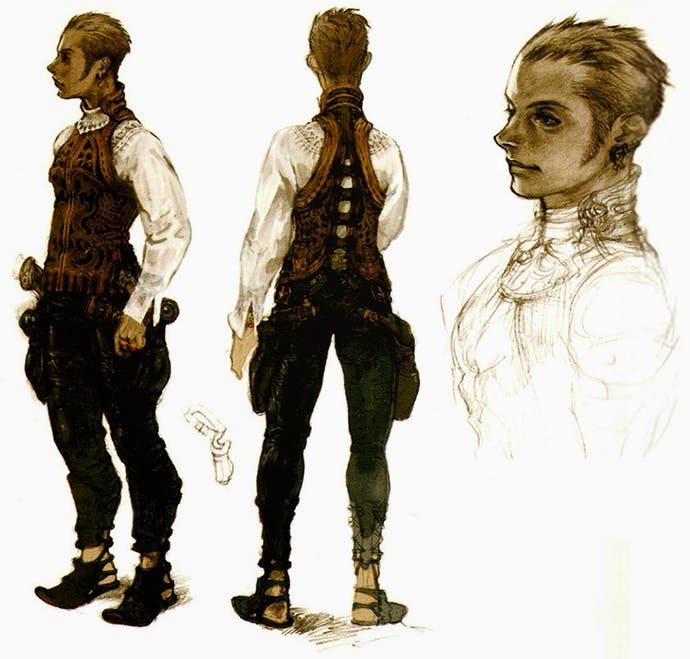
Mastuno deserves some credit, of course, but what helped make Final Fantasy 12 so special is the freedom given to its localisation team to bring a little extra to its magical world of Ivalice. Smith, working alongside Reeder, was given a huge amount of leeway when it came to the localisation of Final Fantasy 12, allowing their work to truly flourish into something spectacular.
Work began in late summer 2005, meaning the team had a full year to work on translation - almost a luxury, it would seem, after the protracted cycles previous games were holden to. The text itself benefitted from a similar approach as Vagrant Story - a game that eventually was retconned to become part of the Ivalice universe - but an extra dimension was added in the voice work.
"I had a lot of say in that, and Joe [Reeder] had a lot of say in that - and we got to work with the same director that we did in Final Fantasy 10-2, Jack Fletcher, and because his roots are really in the Los Angeles voiceover community, he knows a lot of the best people, and they'll come work for him - we were getting some amazing talent, and they'd come in and do even bit parts for us just because Jack was there."
That's partly why the wider world of Ivalice feels so rich. Take Migelo, the Bangaa shopkeeper in the starting town Rabanastre, as an example. A relatively small part was brought to vivid life by John DiMaggio - the voice of Bender in Futurama, and responsible for a number of minor parts in Final Fantasy 12 - in an extravagant performance.
"Just even now hearing the lines completely cracks me up. He brought so much character and flavour to what's a very minor role, and matching the insane lipflaps for a giant lizard man all the while. That really helped the overall quality."
There were other moments of opulence - the Judges, overlords within the world of Ivalice, were brought to life by director Fletcher's friends from the London stage, ushered in as a favour in what was often their first time voicing a video game - as well as translators righting some of the wrongs they'd previously put up with in past projects.
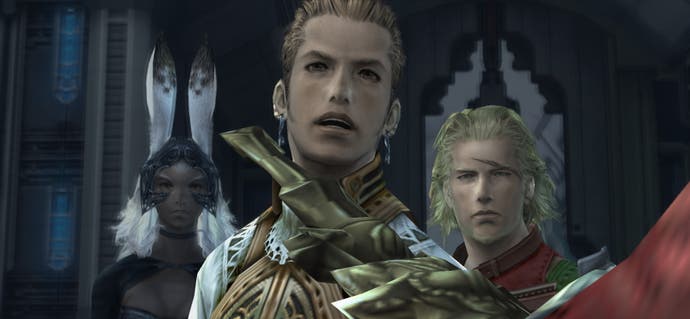
"In a lot of anime dubs and straight-up American cartoons - and this was a pet peeve of Joe's - children are often voiced by women. It has a certain sound to it that people accept, but if you actually hear a young boy speak it's a little different. So in the case of Larsa we had a young actor very close in age to the character - I think he was 14 and not 9 - and that brings a whole other level of realism."
Such extravagances add to the richness of Final Fantasy 12's world, and there's no greater example of the freedom afforded Smith than in one of my own personal favourite characters; the impossibly tall, effortlessly cool she-bunny Fran. It's an interesting case in point when it comes to what good translation can bring to a game - in the original Japanese Final Fantasy 12, Fran's voice is simply a straightforward, slightly gruff read of the character. In the localised version, however, it's something else entirely - and it speaks to one of the game's special traits.
"I think people who played the game in Japanese and then in English were a little shocked by Fran and all the Viera. There's a huge spread of voices in the game, and obviously in Japanese that's not really there. Everyone's speaking standard Japanese. There wasn't a whole lot to go on, but again - with it being another Matsuno-related product - the background was so rich that when you take a game like that it would start to get comical if everyone had regional Japanese accents.
"We decided you've got the Empire, you've got the Resistance and you have a few other dialect groups. We made the Empire British, of course. The Resistance wasn't American - but it wasn't modern west coast, it was roughly 1930s American. We had touchstones for each of the dialect groups. The touchstone for the Resistance was Leonardo DiCaprio in Titanic. We had similar touchtones for other characters in the Empire. For the Viera, we knew we wanted them to be out of the regular system - it's a different race, they have their own mystical environment, so we wanted something while being intelligible was really unusual and exotic. Joe being a big Bjork fan, an obvious go-to was Icelandic English."
It's a striking choice, brought to life by Nicole Fantl, and the results are beyond impressive. It's also an important distinction point to be made between the original and the localised version - playing through the Japanese version, it's amazing how much is lost without the texture of Smith's work, and it's one of the few instances where the dub is the preferable version. That's what happens, I suppose, when you give the translators so much power.
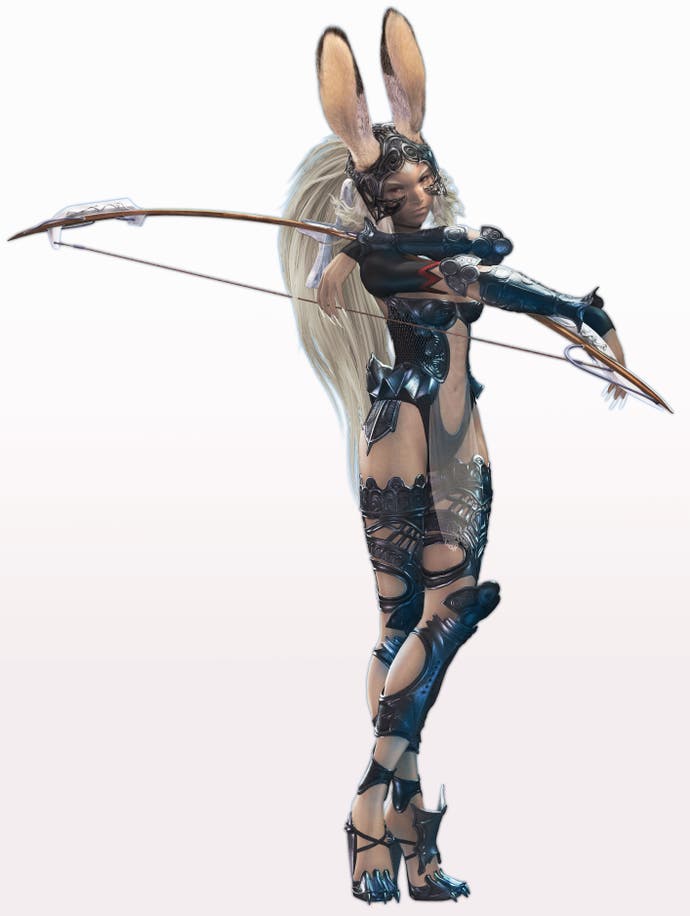
"It's unusual in this industry," reflects Smith. 'Not many companies are set up to give localisation that much say in what goes on. I think I may have been credited as producer on Final Fantasy 12 as well - we certainly got a lot of say on the English edition, how the recording happened and all that was put together. That just made it a much more rewarding experience. And it's fun to be given a set of problems and work your way through them - and that's the job of translation, to figure out what to do with what you're given."
It's all part of what makes Final Fantasy 12 so fascinating, and what makes it stand out to this day - how a confluence of events allowed a visionary director to take charge of a blockbuster series and shape it how he saw fit (before he was moved to step aside, let's not forget), and how a small team of translators were allowed to place their own indelible mark on the game.
"I live in hope that I will get to work on a similarly great game," says Smith, who was involved in some extra translation in the recent Zodiac Age edition of Final Fantasy 12. "They don't make games like that anymore - I don't think they ever made games like that. It's definitely an outlier."
Smith is still involved in Final Fantasy, working on mobile games Mobius and Record Keeper (though sadly not getting to reunite with Matsuno in the designer's recent cameo for Final Fantasy 14's Return to Ivalice), and he still keeps a watching brief on the series. "Final Fantasy is Final Fantasy - it's very different every iteration. I haven't been a huge fan of anything after 12, just personally, but my taste always skewed towards the more western RPGs anyway, and 12 was very western in its approach to everything.
"I haven't played through all of 13 or 15 yet - I'm quite familiar with both of them now because I've been working on Mobius and Final Fantasy Record Keeper - but I've always been hopeful that the cycle will repeat. And they're coming out, at some point, with a remake of 7. That's going to be interesting..."
